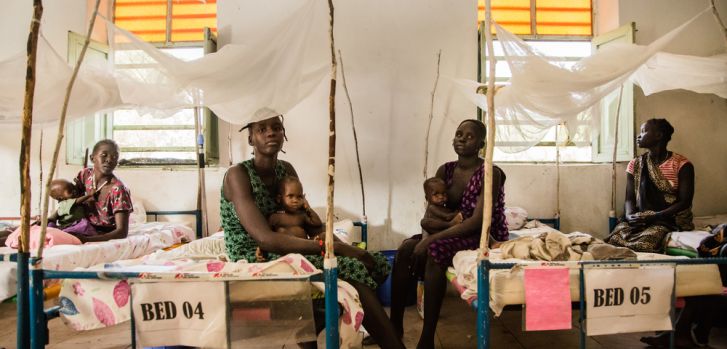By Staff Writer
The burden of malaria is increasing in South Sudan as attention is focused on the global pandemic, COVID-19.
South Sudan is a country with some of the poorest health services where diseases which are easy to treat in other parts of the world are life threatening.
Malaria is deadly and remains one of the most killer diseases in Africa.
Now health facilities in the countryside in South Sudan are getting overwhelmed as cases soar amidst heavy flooding.
In Lakes State, James Mayom has two children admitted at a health facility and diagnosed with malaria.
It’s an ordeal to go through treatment, Mayom told Juba Echo, also noting that sick children are forced to share beds due to the overwhelming cases of the parasite.
“For last two days I spent in the hospital my children are sharing beds with other children, as there are limited beds in the hospital,” he said.
Mayom called for the need to focus on the treatment of the fatal disease.
The surge in malaria is also blamed on the heavy flooding in the countryside, and which has affected 400,000 people already this year, according to the United Nations.
COVID-19 has taken center stage in the health sector globally with most resources channelled towards it.
Likewise in South Sudan, it’s the main focus in the sector posing a threat to the lives of people hit by other ailments including malaria.
Mary Adholhok, whose child is recuperating from malaria at a health facility in Rumbek decried the high number of patients as well as the poor care, especially of children.
“The situation in the hospital is really bad, some of the children used to sleep on the floor without beds due to lack of beds in the hospital,” Adholhok told Juba Echo.
According to South Sudan health cluster bulletin released in the first quarter of the year, malaria was the top cause of morbidity, with a cumulative one million cases reported since week 1, 2021 and accounted for 49.4 percent of total outpatient consultations.
In Lakes State, the paediatric ward in the main hospital in the capital Rumbek is over-swarmed by children infected with malaria forcing many in-patients to be discharged.
With about 50 beds for in-patient, the facility is always overwhelmed as cases swell in hundreds daily.
According to Dr. Barnaba Bol Amukpiu, Acting Director General in the State Ministry of Health, three to four children share a bed.
When treatment rooms are full, injections are even given to the sick from other trees, and which are often affected by rain, Amukpiu said.
Drugs always run out “due to the huge number of patients admitted throughout,” he told Juba Echo.
In Warrap State, health facilities are recording hundreds of cases of malaria everyday amidst shortage of medicine for treatment, Dr. Barach Malith Atem, the Director General of the State Ministry of Health said.
Cases soared most in the months of July and August.
Plans are ongoing with the national malaria control unit to ensure drugs are availed in the state, Atem told Juba Echo early this month.
“We have received the (anti-malaria) consignment early last month and we have prioritized the hard –to- reach areas to be supplied first,” Atem said adding, “we have communicated the issue to the national Malaria Control Unit and we expect drugs to be supplied.”
In Gogrial West, primary health centers have run out of medication, Daniel Apai, the Director in the County told Juba Echo.
“You find one health facility like Gogrial PHCC is recording over 300 malaria cases per day and when you go to another health center you can see 100 to 200 cases of malaria recorded like in Panliet PHCU,” he warned of the malaria situation noting that children under five -years are mostly affected.
“The convulsion among children under- five is too high, every child has fever that you cannot choose which case to deal with first,” he said.
The situation is similar in Tonj North County where there is also a surge in malaria and Pneumonia cases while medication isn’t available.
Nyadit Adoor, a resident of Mayen Abun in Twic County of Warrap state said drugs are being bought from private facilities very expensively.
“The medicine is expensive in the private pharmacies and yet malaria cases are increasing,” Adoor said.
For Achok Nhial Garang, a mother of four in Warrap state, it’s a struggle to deal witrh malaria in the children.
“Many children and women are suffering from malaria but when you go to hospital it is difficult to get drugs.,” Garang told Juba Echo.






